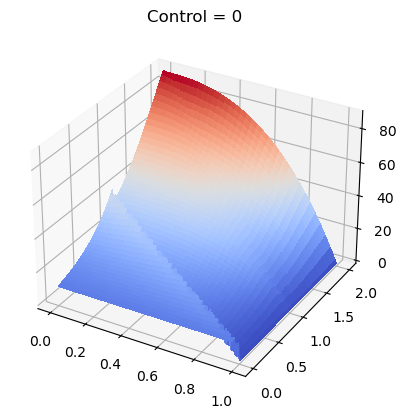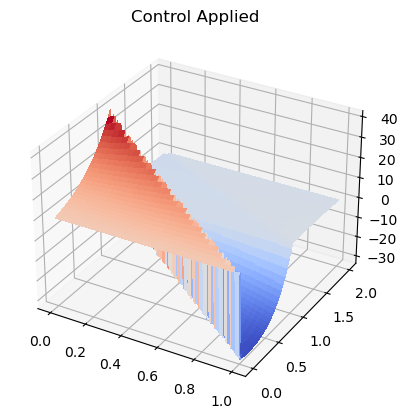I am trying to simulate a hyperbolic PDE with some control given by the following:
$u_t(x, t) = u_x(x, t) + \theta(x) u(0, t)$
with boundary conditions:
$u(1, t) = U(t) = \int_0^1 k(1-y) u(y, t)dy$
We use the finite difference scheme with initial condition $u(x, 0) = c$ with $c> 0$. i is discretization in time and j is in space.
$\frac{u_j^{i+1} - u_j^{i}}{dt} = \frac{u_{j+1}^i - u_{j}^i}{dx} + \theta(x) u_0^i$
Solving yields:
$u_j^{i+1} = u_j^i + dt*(\frac{u_{j+1}^i - u_{j}^i}{dx} + \theta(x) u_0^i)$
I directly implement this into a Python script and the control seems to work quite well, but I get this very odd looking distribution at the start due to the finite difference scheme. This occurs when I set the control to 0 as well.


I believe it is due to the fact the way the initial condition interacts with the time-difference scheme. Is this expected behavior? If not, where is the mistake I am making?
# Simulate PDE to show that this kernel works
T = 2
dt = 0.01
nt = int(round(T/dt))
dx = 0.01
nx = 101
X = np.linspace(0, 1, nx)
u = np.zeros((nt, nx))
c = 10
# Solve for control
def solveControl(kappa, u):
result = 0
for i in range(0, nx):
result += (kappa[nx-i-1]*u[i])*dx
return result
# Set intial condition
for i in range(nx):
u[0][i] = c
for i in range(1, nt):
u[i][-1] = solveControl(kappa, u[i-1])
for j in range(0, nx-1):
u[i][j] = u[i-1][j] + dt*((u[i-1][j+1] - u[i-1][j])/dx + theta[j]*u[i-1][0])